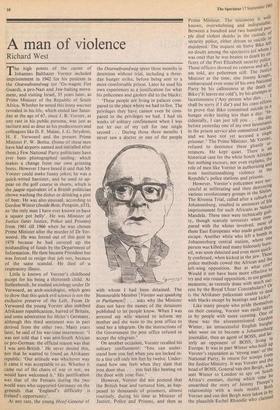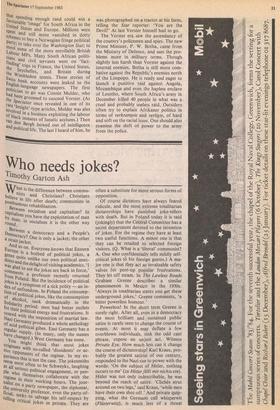A man of violence
Richard West
The high points of the career of Johannes Balthazer Vorster included imprisonment in 1942 for his position in the Ossewabrandwag (or 'Ox-wagon Fire Guard), a pro-Nazi and Jew-baiting move- ment, and visiting Israel, 35 years later, as Prime Minister of the Republic of South Africa. Whether he noted this irony was not revealed in his life, which ended last Satur- day at the age of 67, since J. B. Vorster, at any rate in his public persona, was just as taciturn and as dour as his predecessors and colleagues like D. F. Malan, J. G. Strydom, H. F. Verwoerd and the present Prime Minister P. W. Botha. (Some of these men have had airports named and initialled after them.) Few National Party politicians have ever been photographed smiling: which makes a change from our own grinning bores. However I have heard it said that Mr Vorster could make funny jokes; he was a quick-wined barrister, and he used to ap- pear on the golf course in shorts, which is the jaapie equivalent Of a British politician shown washing the dishes or drinking a pint of beer. He was also unusual, according to Gordon Winter (Inside Boss, Penguin, p21), as 'the only man I have ever known to have a square pot belly'. He was Minister of Justice (later Justice, Police and Prisons) from 1961 till 1966 when he was chosen Prime Minister after the murder of Dr Ver- woerd. He was forced out of this post in 1978 because he had covered up the mishandling of funds by the Department of Information. He then became President but was forced to resign that job too, because of the same scandal. He died of a respiratory illness.
Little is known of Vorster's childhood except for his being a thirteenth child. At Stellenbosch, he studied sociology under Dr Verwoerd, an arch-sociologist, which goes to show that this quick evil science is not the exclusive preserve of the Left. From Dr Verwoerd the young Vorster also imbibed Afrikaner republicanism, hatred of Britain, and some admiration for Hitler's Germany, although this third sentiment was in part derived from the other two. Many years later, he said of his war-time internment: 'I was not told that I was anti-South African or pro-German: the official reason was that I was anti-British.' He never denied this, nor that he wanted to found an Afrikaner republic: 'Our attitude was whichever way it came it was acceptable to us. Whether it came out of the chaos of war or not, we would have welcomed it.' His justification was that of the Fenians during the two world wars who supported Germany on the grounds that 'England's difficulty is Ireland's opportunity'.
At any rate, the young Hoof-General of the Ossewabrandwag spent three months in detention without trial, including a three- day hunger strike, before being sent to a more comfortable prison. Later he used his own experiences as a justification for what his policemen and gaolers did to the blacks:
'These people are living in palaces com- pared to the place where we had to live. The privileges they have cannot even be com- pared to the privileges we had. I had six weeks of solitary confinement when I was not let out of my cell for one single second . . . During those three months I never saw a doctor or one of the people
with whom 1 had been detained. The Honourable Member [Vorster was speaking in Parliament] . . . asks why the Minister does not have the names of the detainees published to let people know. When I was arrested my wife wanted to inform my mother and she went to the post office to send her a telegram. On the instructions of the Government the post office refused to accept the telegram.'
On another occasion, Vorster recalled his solitary confinement: 'You can under- stand how you feel when you are locked in- to a tiny cell only ten feet by twelve. Under- stand how one feels when they slam that iron door shut . . . you feel like beating on the door with your fists.'
However, Vorster did not pretend that the British beat and tortured him, as hap- pened to thousands of prisoners, almost routinely, during his time as Minister or Justice, Police and Prisons, and then as
known, overwhelming and indisputable. Between a hundred and two hundred Pe°:, pie died violent deaths in the custody of' security police, either driven to suicide or murdered. The inquest on Steve Biko left no doubt among the spectators (of whom I was one) that he was beaten to death by.0f- ficers of the Port Elizabeth security
Those officers showed no remorse and all am told are policemen still. The Justice.,
Minister at the time, one Jimmy Kruger, embarrassed even some of his own National Party by his callousness at the death of Biko ('It leaves me cold'), by his attempts at facetiousness ('Any person who dies . • shall be sorry if 1 die') and his crass efforts to prove that Biko committed suicide In a hunger strike lasting less than a day: 'In- cidentally, 1 can just tell you . , the day before yesterday one of my own lieutenants in the prison service also committed suicide and we have not yet accused a single prisoner.' The Prime Minister, Mr Vorster, refused to denounce these ghastly Ut- terances. He kept quiet. There is an historical case for the white South Africans but nothing excuses, nor even explains, the role of men like Vorster in authorising and even institutionalising violence in the Republic's police stations and prisons. However, Vorster's policemen were O. cessful at infiltrating and then destroyIng various revolutionary groups in the Sixties: The Rivonia Trial, called after a suburb nt Johannesburg, resulted in sentences of life imprisonment for such Africans as Nels°r1 Mandela. These men were technically Pi' ty, though scarcely terrorists when com- pared with the whites involved, most of them East Europeans who made good their escape. Another white who left a bomb In Johannesburg central station, where one person was killed and many hideously ed, was soon detected and even more quick- ly confessed, when kicked in the jaw. These police methods cowed the African and the left-wing opposition. But at what cost? Would it not have been more effective to try and win round opposition, to use gentler measures, as recently done with much suc- cess by the Royal Ulster Constabulary? Cir. is the Afrikaner policeman unable to deal with blacks except by beatings and kicks? Like many people who pride themselves on their cunning, Vorster was easily taken in by people with more cunning. One or these was the aforementioned Gordon Winter, an unsuccessful English burglar who went on to become a Johannesburg journalist, then an agent of BOSS, and lat- terly an opponent of BOSS, living in Europe, It was in
part Winter who built up Vorster's reputation as 'strong man' of the National Party, in return for scoops from the Justice Ministry. It was Vorster and the head of BOSS, General van den Bergh, wh? sent Winter to London to spy on Soutil Africa's enemies, during which time he unearthed the story of Jeremy Thorpe's i relationship with a male model. Both Vorster and van den Bergh were taken n bY the plausible Eschel Rhoodie who claimed
that spending enough rand could win a favourable 'image' for South Africa in the United States and Europe. Millions were sPent and still more vanished in dotty schemes to buy a Norwegian fringe political Party: to take over the Washington Star;. to enrol some of the more enrollable British Labour MPs. Many eians South African and civil servants went on 'fact- finding' trips to France, the United States, the , Seychelles, and Britain during tne. Wimbledon tennis. These stories of Swiss bank accounts were leaked to the English-language newspapers. The first Politician to go was Connie Mulder, who had been groomed to succeed Vorster. (As the Spectator once revealed in one of its !'are Insight'-type articles, Mulder was also involved in a business exploiting the labour of black inmates of lunatic asylums.) Then van den Bergh bowed out of intelligence and political life. The last I heard of him, he was photographed on a tractor at his farm, telling the Star reporter: `You are the Devil!' At last Vorster himself had to go. The Vorster era saw the ascendancy of the country's policemen and spies. The new Prime Minister, P. W. Botha, came from the Ministry of Defence, and sees the pro- blems more in military terms. Though slightly less harsh than Vorster against the internal enemies, Botha is still more com- bative against the Republic's enemies north of the Limpopo. He is ready and eager to launch a punitive raid against Angola, Mozambique and even the hapless enclave of Lesotho, where South Africa's army in December killed 40 people in what was a cruel and probably useless raid. Outsiders often try to explain Afrikaner politics in terms of verkrampte and verligte, of hard and soft on the racial issue. One should also examine the shift of power to the army from the police.







































 Previous page
Previous page